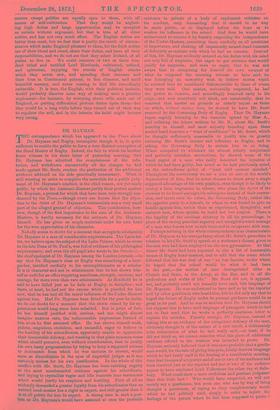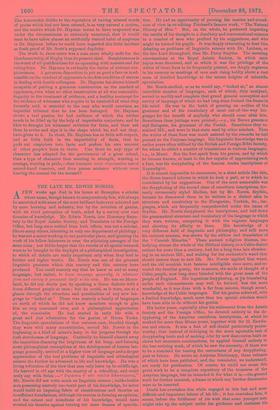DR. HAYMAN.
THE correspondence which has appeared in the Times about Dr. Hayman and Rugby, incomplete though it is, is quite sufficient to enable the public to form a very distinct conception of the Head Master of Rugby. Indeed, the fact to which his 'brother bears witness in his short letter of yesterday morning, that Dr. Hayman has admitted the completeness of the refu- tation, and withdrawn unreservedly all the charges he had made against Mr. Scott, renders the production of the additional evidence adduced on his side practically unnecessary. What is still wanting in order to complete the materials for a public judg-
ment of Dr. Hayman's conduct, is the chief reason, not yet made public, by which the Assistant-Masters justify their protest against -Dr. Hayman, a protest for which they have been very strongly con- demned by the Times,—though every one knows that the objec- tion to the dates of Dr. Hayman's testimonials was a very small part of the alleged ground of objection. This justification, how- ever, though of the first importance to the case of the Assistant- Masters, is hardly necessary for the estimate of Dr. Hayman himself. He has given us ample materials under his own hand for the true appreciation of his character.
Nobody seems to doubt for a moment that as regards scholarship Dr. Hayman is a man of considerable acquirements. The Latin let- ter, we believe upon the subject of the Latin Primer, which he wrote to the late Dean of St. Paul's, was full of evidence of his philological acquirements; and even the old pupil who wrote to the Standard,— the chief apologist of Dr. Hayman among the London journals,—to say that Dr. Hayman's class at Rugby was something of a bear- garden, testified cordially to his accomplishments as a scholar. It is in.character and not in attainments that he has shown him- self so unfit for an office requiring manliness, strength, candour, and courage, far more even than rare attainments. At Bradfield he is said to have failed just as he fails at Rugby, in discipline ; and there, at least, he had not the excuse which is pleaded for him now, that he has had all the moral influence of the Under-Masters against him. Had Dr. Hayman been fitted for the post he holds, we do not doubt for a moment that the storm raised by his ap- pointment would long since have subsided. But in point of fact, he has himself justified with curious, and one might almost imagine anxious care, the unfavourable impressions formed of him when he first assumed office. He has shown himself weak, jealous, suspicious, credulous, and uncandid, eager to believe in the hostility of his subordinates, apparently unable to appreciate their honourable delicacy, and wanting in that plain common-sense which should perceive, even without consideration, that to justify his own hasty prepossessions by trying to keep a supposed witness to statements from which he was anxious to retreat, would seem as discreditable in the eyes of impartial judges as it was certainly useless for his own justification. In the whole of this conflict with Mr. Scott, Dr. Hayman has been catching eagerly at the most unsubstantial evidence against his subordinate, and trying to crystallise vague and idle rumours into statements which would justify his suspicion and hostility. First of all he evidently demanded a greater loyalty from his subordinates than an untried head-master has a right to expect, and still greater than it is at all politic for him to expect. A strong man in such a posi- tion as Dr. Hayman's would have assumed at once the probable
existence in private of a body of unpleasant criticism on his conduct, only demanding that it should in no way be made public, or so displayed before the boys as to weaken his influence in the school. And then he would have endeavoured to remove it by frankly respecting the independence of the Under-Masters, consulting them cordially on all questions of importance, and shaking off impatiently second-hand rumours of disloyalty as matters with which he had no concern. Instead of this, Dr. Hayman evidently entered on his duties with his mind not only full of suspicion, but eager to get evidence that would justify his suspicion, and even so eager, that he was not aware that in composing for himself his own account of what he supposed the accusing witness to have said, he was betraying an unworthy wish to believe stories which he avowed that he considered dishonourable to those of whom they were told. One master, universally respected, he had the power to remove, and accordingly removed early in his reign ; and now everybody will think, not unnaturally, that he removed that master on grounds as utterly unjust as those on which, without stating them, he desired to have Mr. Scott removed by the Governing Body of Rugby. Then Dr. Hayman began eagerly listening to the rumours spread by Miss A., and collating the letters written by Mr. B., about Mr. Scott's hostility to himself, and most unjustly founding upon these second-hand rumours a "want of confidence" in Mr. Scott, which he thought sufficiently reasonable to justify him in greatly reducing Mr. Scott's income and influence at Rugby, and in asking the Governing Body to sustain him in so doing. When compelled to withdraw his almost utterly conjectural and perfectly mistaken accusations, he showed none of the frank regret of a man who really lamented the injustice of which he had been guilty, but acted as he had previously acted, on the unhandsome policy of " least said soonest mended." Throughout the controversy we see a man so sore at the world's depreciation of him, that he never chooses to throw away a single supposed advantage of his own position, even though it be likely to convey a false impression to others; who plans the defeat of the enemies to be found amongst his colleagues instead of their conver- sion, and treats even his rulers, the Governing Body, rather like the opposite party in a lawsuit, to whom he was bound to give no handle against him, rather than as experienced, thoughtful, and eminent men, whose opinion he could not but respect. There is the legality of the cautious attorney in all his proceedings, in place of the strong practical sagacity and straightforward courage of a man who knows how to rule boys and to co-operate with men.
Perhaps nothing in the whole correspondence is so characteristic of Dr. [layman as his strange fancy about Mr. Scott's procedure in relation to his (Mr. Scott's) speech at a workmen's dinner, given to the men who had been employed on the new gymnasium. At that dinner Mr. Scott had been reported to cite a list of honourable names of Rugby head-masters, and to add that the name which followed that list was that of one "no less famous, under whom he hoped that the school would be what it had been in the past,—the mother of men distinguished alike in Church and State, in the Army, at the Bar, and in all the professions and walks of life." Mr. Scott did not, it appears, use, and probably could not honestly have used, this language of Dr. Hayman. He was understood to have said so by the reporter and by other gentlemen who heard him, but he did only say that he hoped the future of Rugby under its present guidance would, be as great as its past. And he was so anxious that Dr. Hayman should not suppose him to have used language of panegyric which he had not in fact used, that he wrote a perfectly courteous letter to explain the mistake. Funnily enough, Dr. Hayman, instead of taking this as an evidence of the scrupulous delicacy of the man, obviously thought it of the nature of a new insult, a deliberately false retractation of what he had really said, —at least, if he did not think so, we cannot conceive what this piece of additional evidence offered to the trustees was intended to prove. Dr. Hayman seriously believed that it was more probable that a gentle- man would, for the sake of giving him pain, falsely disavow language which he had really used in the hearing of a considerable meeting, than that the ears of a reporter and of one or two of the audience had been deceived just as the reporter and one or two of the audience appear to have mis-heard Lord Folkestone the other day at Salis- bury. What could show a more credulous and partisan judgment than this little fact ? Who would have suspected, we will not merely say a gentleman, but even one who was by way of being thought a gentleman, of trying to deny complimentary words which he had publicly used, simply in order to injure the feelings of the person whom he had been supposed to praise ?
The honourable dislike to the reputation of having uttered words of praise which had not been uttered, is so very natural a motive, and the motive which Dr. Hayman seems to have suspected was under the circumstances so extremely unnatural, that it would seem to have taken almost an artificially trained habit of suspicion in Dr. Hayman before he could have regarded this little incident as fresh proof of Mr. Scott's supposed duplicity.
The truth is, there never was a man more wholly unfit for the Headmastership of Rugby than its present chief. Suspiciousness is the worst of all qualifications for co-operating with masters and for ruling boys. Dr. Hayman is evidently the victim of extreme sus- piciousness. A generous disposition to put as good a face as is ad- missible on the conduct of opponents is the first condition of success in dealing with hostile colleagues. Dr. Hayman has shown himself incapable of putting a generous construction on the conduct of opponents, even when no other construction at all was reasonable. Sagacity in the treatment of evidence, and a healthy contempt for the evidence of witnesses who require to be reminded of what they formerly said, is essential to the man who would convince an impartial tribunal that he has been betrayed. Dr. Hayman shows a real passion for bad evidence of which the outline needs to be filled up by the help of improbable conjecture, and he likes to draught his witnesses' evidence for them, and then ask them to revise and sign it in the shape which he, and not they, have given to it. In short, Dr. Hayman has so little self-respect, and so little faith in the impartiality of facts, that he pads out suspicions into facts, and prefers his own account of other people's facts to theirs. Can there be any type of character less adapted for the government of a great school, than a type of character thus wanting in strength, wanting in courage, wanting in pride,—that concocts actes d'accusation out of second-hand rumours, and then passes sentence without even hearing the counsel for the accused ?



































 Previous page
Previous page